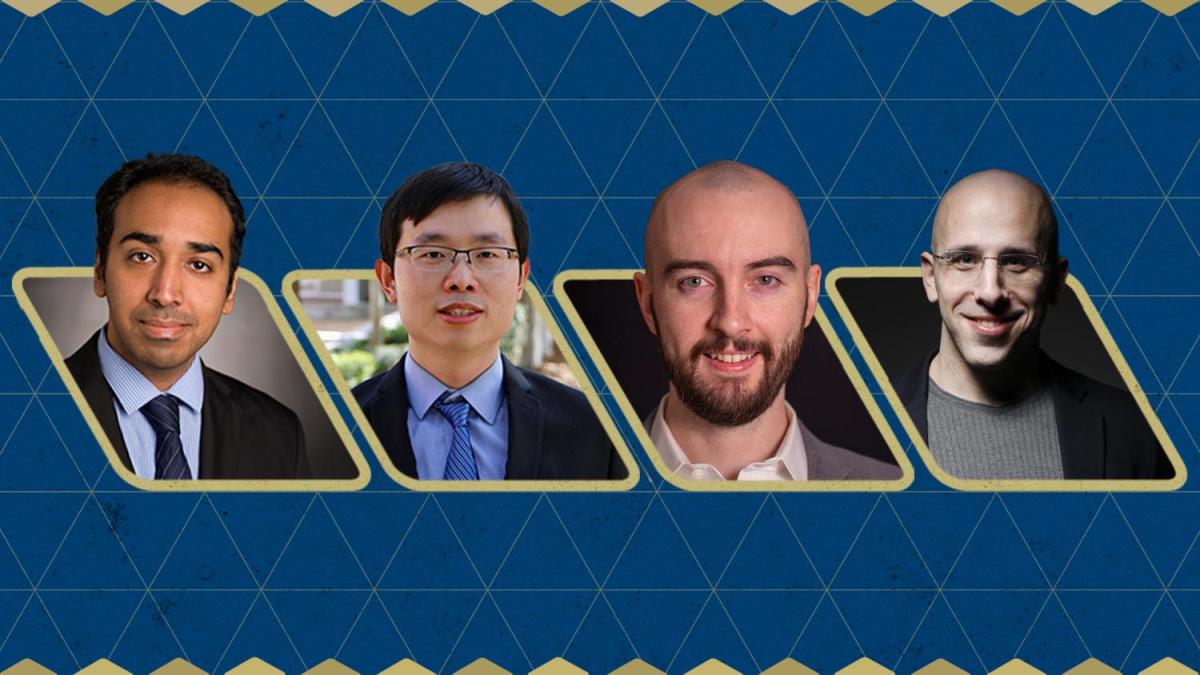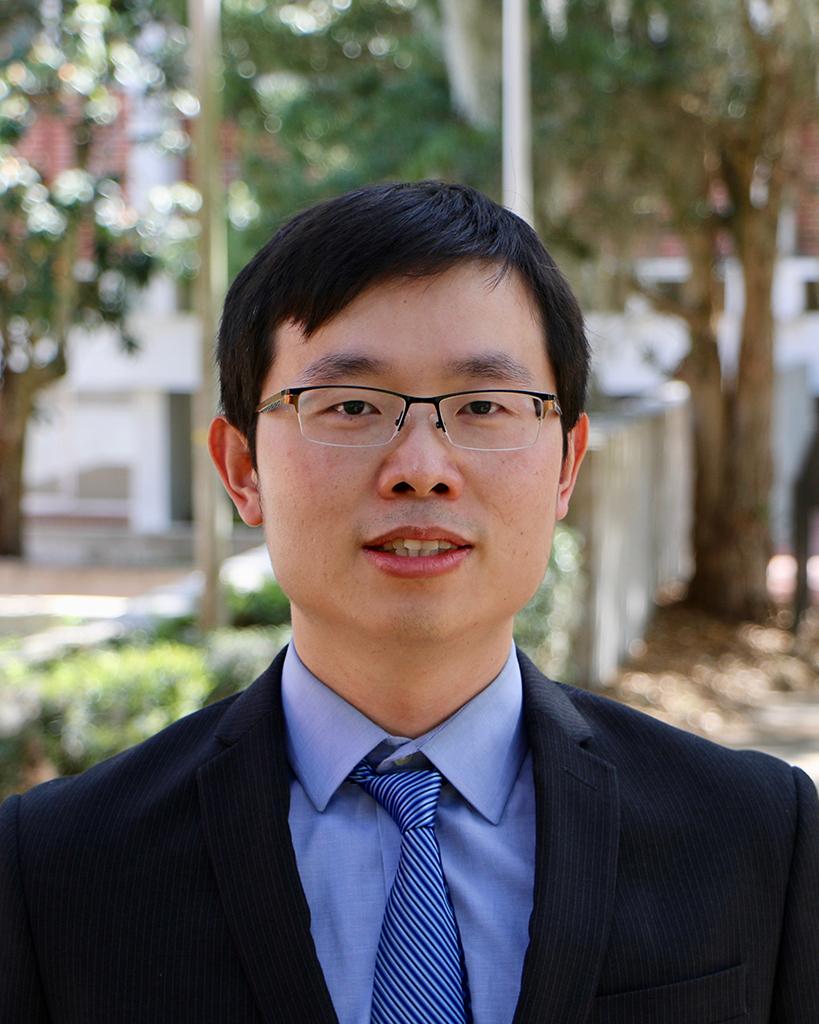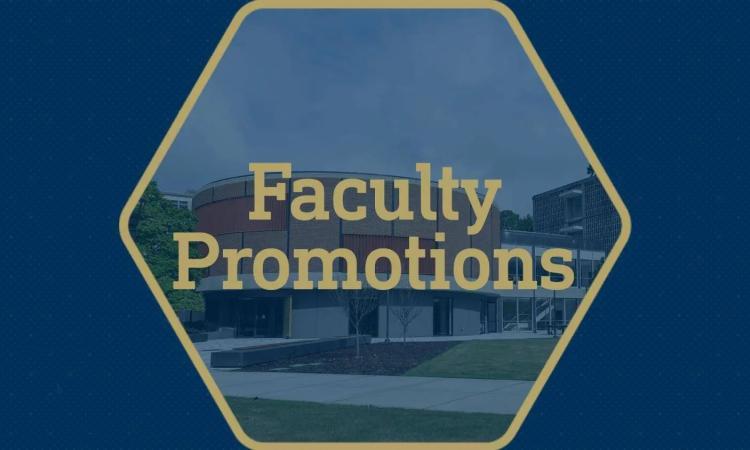
The Georgia Tech School of Electrical and Computer Engineering (ECE) is excited to welcome four new faculty members for the start of the 2024 Fall semester, bringing a wide range of new and exciting expertise.
Viveck Cadambe joins as an associate professor, with Baoyun Ge and Matthew Flavin serving as assistant professors. Jeffrey Epstein joins ECE as a senior lecture.
Get to know the new faces at ECE below.

Viveck Cadambe
Associate Professor
TIG: Telecommunications and Computer Systems and Software
Cadambe received his Ph.D. from the University of California, Irvine. Between 2011 and 2014, he was a postdoctoral researcher, jointly with the Electrical and Computer Engineering Department at Boston University and the Research Laboratory of Electronics (RLE) at the Massachusetts Institute of Technology (MIT).
His research group focuses on the theoretical and mathematical foundations of several applications, most commonly using tools from information theory. His research interests include secure and privacy-preserving machine learning, cloud storage and database services, and wireless networks. In addition to theoretical explorations, Cadambe’s group conducts systems prototyping and implementations for several research projects.
He has been recognized with numerous awards, including the 2009 IEEE Information Theory Society Best Paper Award, the 2014 IEEE International Symposium on Network Computing and Applications (NCA) Best Paper Award, an NSF Career Award in 2016, and a 2019 Google Faculty Award. He is currently an associate editor for IEEE Transactions on Communications.

Baoyun Ge
Assistant Professor
TIG: Electrical Energy
Tell us about yourself.
I received my B.E. degree in electrical engineering from Southeast University, Nanjing, China in 2012, followed by a Ph.D. in electrical and computer engineering from the University of Wisconsin-Madison (UW-Madison) in 2018. I then worked at C-Motive Technologies, Inc., a start-up company pioneering in the commercialization of electrostatic machines. From May 2022 to July 2024, I was with the University of Florida as an assistant professor before joining the Georgia Institute of Technology.
What are your research interests?
Electromechanical energy conversion and power electronics, with a special focus on their topologies and multiphysics design to promote long-term sustainability.
What research are you currently working on?
Multiple things are going on in my lab. Our work ranges from miniature motors for surgery applications to megawatt-scale generators for harnessing wind energy. We also work on untethered actuation for advanced manufacturing, direct energy conversion for underwater propulsion, and more. It may seem the topics are spread everywhere, but there is one central theme to all of them: new topologies and multiphysics design. The ideas enabling these projects come from human intuition
I am also exploring a new research territory in multiphysics synthesis. It is about overcoming the limitations of conventional intuition-based multiphysics design by leveraging advanced mathematical tools. This research, while not focused solely on AI, shares a similar vision of achieving human and beyond human-level intelligence. I was fortunate to have received the CAREER Award from the National Science Foundation for the new multiphysics design paradigm I am dreaming of.
What are some past accomplishments you are most proud of?
My previous research thrusts on electrostatic machines established multi-level connections (physics, circuits, and topologies) with magnetostatic machines. I have extensive experience in analytical modeling and high-performance computational models. These experiences and the duality between electrostatic and magnetostatic machines inspired me to work on multiphysics synthesis. For this electrostatic machine work, I was recognized by the Harold A. Peterson Distinguished Dissertation Award from UW-Madison, a first-place paper award from IEEE Industry Applications Society, and more.

Matthew Flavin
Assistant Professor
TIG: Bioengineering
Tell us about yourself.
I am an assistant professor in the ECE where I lead the Flavin Neuromachines Lab.
Before joining the faculty at Georgia Tech, I was a postdoctoral researcher at Northwestern University. I received my M.S. and Ph.D. degrees in electrical engineering in 2017 and 2021 from the MIT and received my B.S. in electrical engineering in 2015 from the University of Illinois at Urbana-Champaign (UIUC).
The vision for my independent research program is to develop powerful peripheral neural interfaces and mechatronic wearables that leverage advanced sensors and intelligent systems to address important and unresolved challenges in patient care.
What are your research interests?
From the beginning of my career, one of my goals was to apply my background in electrical engineering and bioengineering to expand solutions for treating neurological disorders. I developed a bioelectronic drug delivery platform that I demonstrated could be used to enhance and control the functional selectivity of neuromodulation in a peripheral nerve. This motivated my subsequent work as a postdoctoral researcher at NU, which focused on developing multimodal mechanosensory interfaces (haptics).
My key insights from this research, is that there exists a fundamental tradeoff between the selectivity and invasiveness of current neural interfaces, but well-suited alternatives, such as haptic feedback, can bypass those limitations in certain cases.
What research are you currently working on?
I am currently working on capabilities for fast, programmable manipulation of human sensory perception that have wide-ranging applications in therapeutic biomedical systems, including somatosensory interfaces that substitute or augment missing sensory capabilities.
Compared with most wearable electronic devices, haptics interfaces can benefit from wider coverage across the surface of the skin. This research direction will address significant untapped potential in these areas by introducing a more expansive concept of somatosensory interfaces (haptics) that can be flexibly adapted to address a wide range of intractable problems in physical/rehabilitative medicine (such as stroke and spinal cord injury) and pain.
What are some past accomplishments you are most proud of?
My publication record from NU and MIT centers around biomedical demonstrations as part of several multi-site, long-term, collaborative efforts that I led. My contributions are featured in high-impact journals, including Science, Proceedings of the National Academy of Sciences (PNAS), and Nature Communications. I also received the National Institutes of Health (NIH) Ruth L. Kirschstein Institutional National Research Service Award and the Draper Laboratory Fellowship.

Jeffrey Epstein
Senior Lecturer
TIG: Computer Systems and Software
As a senior lecturer, Epstein will be teaching courses on hardware/software systems, as well as new instruction on general GPU programming.
He is a distinguished computer scientist with a Master of Philosophy in advanced computer science from the University of Cambridge and a BA in computer science from Hunter College, both with top honors.
He has designed and taught classes at Emory, NYU, Wesleyan, Eötvös Loránd University (Budapest), and the National University of Mongolia, covering a wide range of computer science subjects, including distributed systems and computer architecture.
Epstein has also held senior engineering roles at Commerce Guys, Parallel Scientific, and Siemens, where he contributed to significant projects in cloud computing and distributed systems.
Additionally, he is a published researcher and conversant in multiple languages, including Czech, Spanish, and Hungarian.
Related Content
Hernandez-Mejia Appointed Interim Director of NEETRAC
Hernandez-Mejia, who has worked at ECE’s National Electric Energy Testing, Research, & Applications Center (NEETRAC) since 2017, brings extensive experience to the member-driven electric utility research center.
Six ECE Faculty Members Receive Promotions
Two ECE professors and four researchers were among the Georgia Tech faculty to receive a promotion following the 2024 Spring semester.

